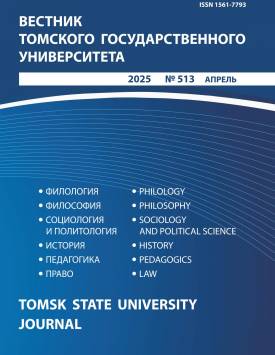Aleksei Losev's religious philosophy in the light of postsecular theory
This article deals with a number of concepts of Losev's philosophical system in the context of postsecular thought. It is noted that the problem of whether Russian religious philosophy can be considered as a variant of postsecular thought is debatable. It is shown that a number of concepts of Losev's system (the One, myth, symbol) outwardly correlate as much as possible with the ideas of philosophers and theologians of post-secular thought (J.-L. Marion, J. Derrida, Ch. Taylor, J. Milbank). Special attention is paid to the thesis that the theoretical basis for the development of postsecular ideas deals with the development of postmodern and postmeaphysical philosophy, so the research is focused specifically on the philosopher's metaphysical concepts. In particular, the concepts of the One (Henology), the concept of myth and the concept of the symbol in Losev are considered. It is noted that the One, which is the central concept of his philosophical system, assuming an apologetic meaning (creation of a system of absolute dialectics and mythology - dialectics and mythology of Divine Being) is subject to criticism in European postmodernism as the main metaphysical concept, while in postmetaphysics it is rehabilitated again. It is found that the postmodern critique of the One is based on Platonism understood quite differently from Losev's. For Losev, Platonism is dialectical, the One is apophatic, extra-attributive and indescribable. Losev's concept of myth presupposes a view of the history of thought according to which any social discourse develops according to the principles of absolute dialectics, but with methodological distortions, forming a huge number of relative myths in which humanity lives. As for all post-secular theorists, the question of the reasons for the development of secularism is important for Losev. It is noted that, according to the Russian thinker, it is the falling away from the dialectical method (absolute dialectics developed in Christian Neoplatonism) and, as the first consequence, the rejection of the apophatic One that gradually lead the world to the crisis of secularisation. A comparative analysis reveals that Losev's symbolism and aesthetics, coming from his genology, converge with a new current in European theology - theoesthetics, with the difference that for Losev the most important aspects of aesthetics are the criticism of dualistic ideas about reality (leading, among other things, to the alienation of God and the world, the transcendent from the immanent, which is in line with other post-secular theorists, for example, J. Milbank) in favour of the Whole, and the theoesthetic - the existential experience of beauty as proof of divine existence. The article concludes that Losev's philosophy, which responds to the challenges of Soviet atheism, although significantly different from European postsecular thought, nevertheless has a great number of similarities, which is why it may well be called one of the variations of the postsecular project. The author declares no conflicts of interests.
Keywords
secular, postsecular, Russian religious philosophy, A.F. Losev, postmetaphysical thinking, problem of symbol, unity, genologyAuthors
| Name | Organization | |
| Gravina Irina V. | HSE University | ei-rene@ya.ru |
References

Aleksei Losev's religious philosophy in the light of postsecular theory | Vestnik Tomskogo gosudarstvennogo universiteta – Tomsk State University Journal. 2025. № 513. DOI: 10.17223/15617793/513/7
